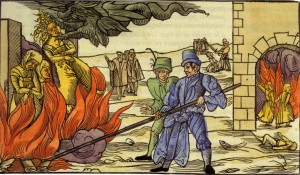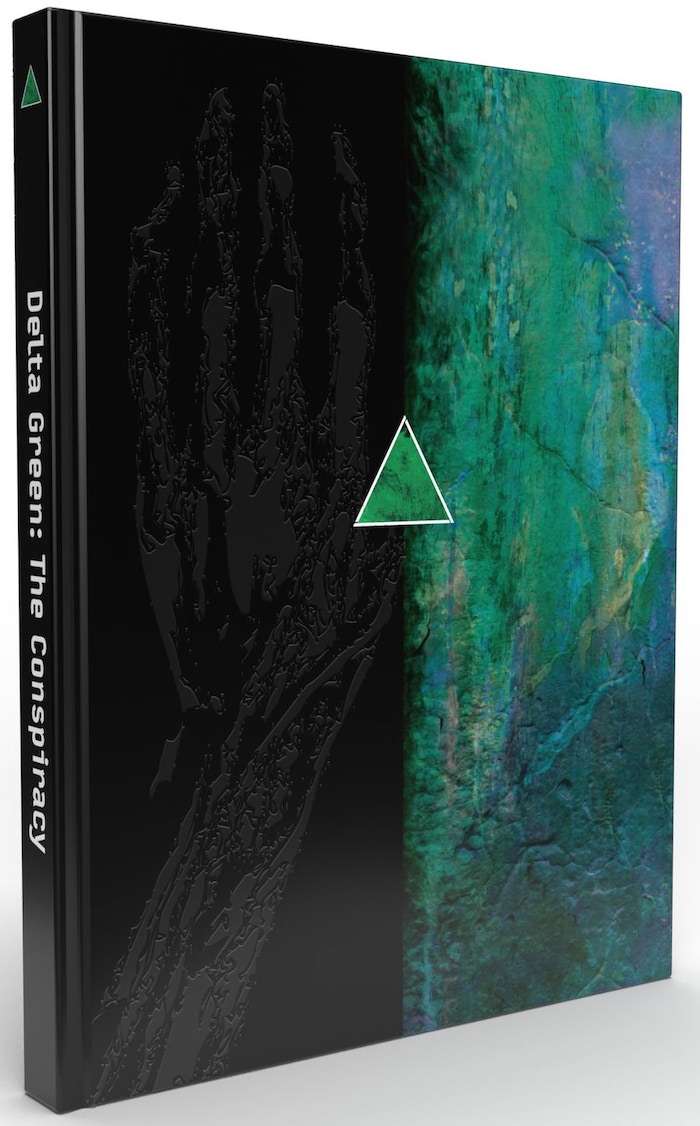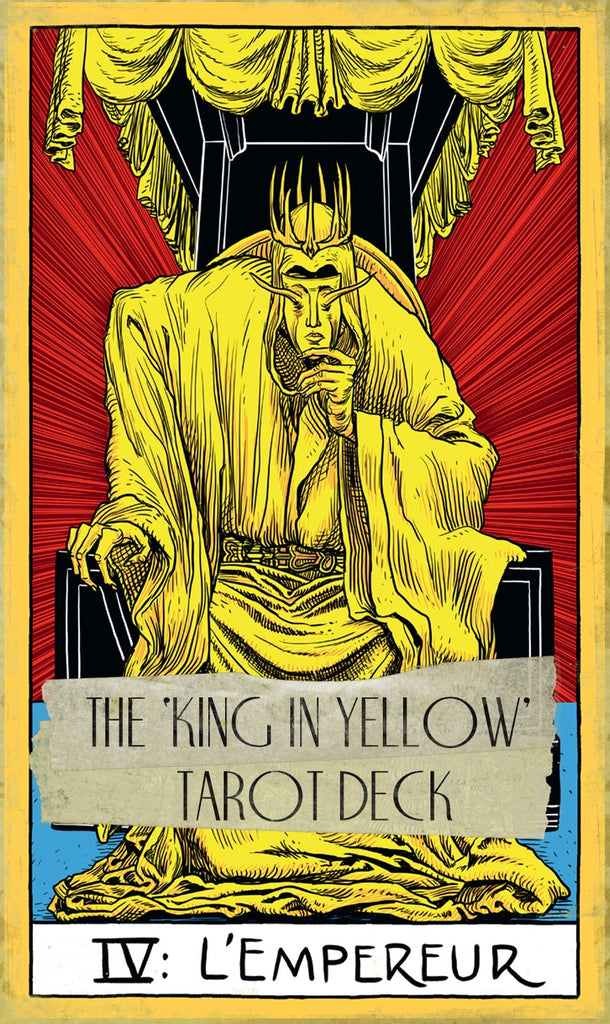By Adam Scott Glancy, © 2005
Editor’s note: Adam Scott Glancy’s “Directives from A-Cell” column first appeared in Worlds of Cthulhu and now can be found in The Unspeakable Oath.
One reason of the main reasons I wanted to write about the U.S. government’s interest in the Cthulhu Mythos was that Lovecraft himself gave me the opening with the government raid against the Esoteric Order of Dagon in his story “The Shadow Over Innsmouth.” With that one opening my co-authors and I extrapolated the entire Delta Green conspiracy.
But the U.S. government isn’t the only source of institutionalized opposition to the Mythos mentioned by Lovecraft. The Catholic Church and the Holy Inquisition appear often, usually as a footnote or as part of the back-story. Lovecraft often portrays the Catholic Church as suppressing Mythos knowledge and destroying Mythos tomes like the De Vermis Mysteris and Cultes des Goules. More than a few Mythos-worshipping sorcerers like Ludwig Prinn meet their end at the hands of the Inquisition. Frequently when the old evil comes forth again it is because the Inquisitors of yore left their task half-done. There’s always some tunnel they incompletely sealed, some incantation they couldn’t bring themselves to intone, or some book they failed to burn. But they are in the stories, doing their best to keep this evil at bay, if not always succeeding.
So if we have multiple stories citing the suppression of the Mythos by the Catholic Church, then why not extrapolate an arm of the Catholic Church dedicated to eradicating the physical manifestations of evil here on Earth? The added benefit here is that a Vatican monster squad with a worldwide reach could provide players anywhere in the world with a venue for playing Call of Cthulhu in the modern conspiracy genre of Delta Green.
The Holy See in Rome often organizes specific Vatican functions into Congregations. The task of detecting and eliminating heretical clergy belongs to the Congregation for the Doctrine of the Faith, once called the Inquisition. The Congregation for the Causes of the Saints is the organization that documents and authenticates miracles. So for the time being, let’s call our group of Vatican Investigators “the Congregation.”
What They Believe
As mentioned in the first Directive from A-Cell, when coming up with a new organization for the Delta Green universe it’s important to figure out its scope, mission, history and theme. In the case of Vatican Investigators there is another attribute that must be determined: how the group’s theological beliefs affect their view of the Cthulhu Mythos.
In Lovecraft’s universe (and I cannot stress more emphatically that I am talking about a fictional world here) the God of Abraham, Moses, Jesus and Mohammed is just an imaginary friend that we hairless apes made up to comfort ourselves when we’re afraid of the dark. Delta Green takes a canonical view of Lovecraft’s universe, so let’s stick close to Lovecraft’s vision of a scary, hostile universe where Christianity has no supernatural power to repel or contain the Cthulhu Mythos and the rituals and symbols of the Catholic Church will be useless to our team from the Congregation.
Understanding that, the question remains whether the Congregation see the Mythos as something distinct from their faith, or as part of their eschatology? Are they are going to see Nyarlathotep as Satan and the other Outer Gods and Great Old Ones as filling in for the various demons named in the Bible and traditional sources on demonology (Cthulhu as Leviathan; Azathoth as Astoroth)? Or are do they see the Outer Gods and Great Old Ones for what they are: powerful, extra-dimensional alien entities, more a matter of misunderstood physics than magick? The problem with seeing the Mythos as part of traditional medieval demonology is that the Congregation will never really understand what they are fighting and this could lead to deadly mistakes. If the Congregation sees Mythos magic as Satanic sorcery, they are unlikely to use banishing or protective spells, further hampering their effectiveness. Their false belief in the power, rituals and symbols of Christianity will also lead to more casualties and failures. On the other hand, the problem with truly understanding the nature of the Lovecraftian universe is that such knowledge is mentally corrosive and will cause an Investigator to lose faith and sanity, and perhaps even turn to worshipping the ‘real’ gods of the Mythos. For reasons that I will explain later, I believe that the Congregation is more likely to view the Mythos as just more traditional Judeo-Christian demonology.
Who They Are
So what kind of clergy are likely to join the Congregation? Certainly there are very liberal trends in the Catholic clergy, particularly among the youngest generation. A noteworthy example of this trend is Liberation Theology, a movement that began as a reaction against authoritarian regimes in Latin America during the 1980s. Liberation Theology clergy are more concerned with their parishioners’ access to food, shelter, medical care and the political system than they are with their spiritual life. These liberal trends produce clergymen who are more interested in opening a food bank or free clinic than combating physical manifestations of supernatural evil, which is a concept that liberal ‘modern’ clergy are likely to scoff at. Faced with a case of possession, Liberation Theology clergy are going to phone the county mental health services and call it a night.
It’s far more likely that Congregation members would be very socially and politically reactionary. On matters of Catholic doctrine the Congregation is perfectly orthodox; we’re not talking about those Society of St. Pius X fossils that claim every Pope since the Second Vatican Council is a heretic. But members of the Congregation are going to believe that the world took a wrong turn in the 19th century, beset by a plague of ‘modernity’ that has delivered such ills as scientific materialism, social permissiveness, and moral relativism. They are the kind of men who approve of highly conservative Catholic lay organizations like Opus Dei. They are not willing to discuss or acknowledge the mistakes the Vatican has made over the centuries, particularly in the realm of politics. Such introspection can only lead to doubts about their church, their faith and their mission. It’s their moral certainty that allows the Congregation to justify their ruthless actions in the service of the Church. And if their actions serve the Church, then they must also serve God. This could give the impression to secular investigators that the Congregation is bunch of self-righteous, closed-minded, religious bigots; and they’d be right, but not the way they think.
Scope
The Congregation’s scope is going to be worldwide, just like the Catholic Church itself. Unlike Delta Green, where members can use their official capacity to aid their investigations or even act with genuine law enforcement jurisdiction when prosecutable crimes are detected, the Congregation has no government authority to act in any way. Its members are nothing more than members of the Catholic clergy, or lay employees of the Vatican. That means that if they cannot convince the local authorities to act and they take vigilante action against human agents of the Mythos, they will find themselves on the wrong side of the law. These investigations are going to be much closer to traditional Call of Cthulhu investigations, where the Investigators end up routinely skirting the edge of legality. The big difference is that they could have nearly unlimited operational funds, a worldwide organization to support them, one of the world’s largest archives to draw on for research, and perhaps even diplomatic immunity.
These days the Catholic Church is quite sensitive to scandal, so the Congregation is not expected to be getting into firefights and dynamiting archeological sites, although it has come to that now and again. When illegal violence appears to be the only solution, the Congregation calls on the services of an elite and deniable group of volunteers: the Sicarii. The Sicarri, which is Latin for ‘dagger men,’ are members of the Swiss Guard who have resigned in order to join this elite unit. If any agents of the Congregation (or the Sicarri) are arrested and prosecuted for crimes committed on a mission, the Catholic Church isn’t going to publicly support them. The Vatican would through intermediaries secretly arrange for their bail, hire their attorneys and even use whatever back-room influence they have to get them off the hook, but Congregation agents are expected to keep to a code of silence even in the face of imprisonment, torture and death. Such is the discipline expected from soldiers of God.
Mission
The Congregation’s mission is twofold. They are charged with eliminating the physical manifestations of supernatural evil, but more importantly they must suppress public knowledge of the existence of the Mythos. If the world knew the reality of the Lovecraftian universe, it would cause millions to lose faith in Christianity, perhaps even accelerate the end times as those faithless millions (or even billions) turn to the worship of the alien gods of the Mythos. Some members of the Congregation may suspect the true nature of the Lovecraftian universe, but that knowledge only spurs them to greater zeal in suppressing the truth. For the Congregation, concealing the truth about the Mythos is going to be just as important as eliminating cultists, closing gates, and banishing demons.
Destroying Mythos tomes is a primary objective of the Congregation. This could easily bring them into conflict with other groups of Investigators who want to combat the Mythos with the knowledge locked away inside such forbidden tomes as the Necronomicon. There might be just the banishing spell the investigators need in a book in the Congregation’s possession, but they will not allow anyone to see it, at least not until after they incinerate it. Even worse, if the Investigators have a publicly known cache of Mythos tomes there is a good chance the Congregation will first attempt to buy the books and, failing that, will steal them or destroy them. The Congregation cannot trust that the Investigators are not cultists, or that they might not later become cultists because of the dire influence of the Mythos tomes. No matter what the cost in lives might be, for the Congregation anything is better than endangering the souls of billions.
History
Considering the nearly two millennia of church history, it’s highly unlikely that a single church agency would be conducting this mission continuously since the time of Emperor Constantine the Great. After all, the Inquisition has gone through multiple reorganizations since its first appearance in 1184 A.D. More than likely our Congregation was created to take over some of the duties that the Inquisition could no longer publicly perform. By 1871 the last of the Papal States had been conquered as part of the campaign for Italian Unification and the Papacy lost its temporal powers. That lack of temporal power means that the Congregation couldn’t operate like the Inquisition did in the past, as an officially recognized arm of the church. Instead the Congregation operates like an ‘off-the-books’ intelligence service of the Holy See. Money for operations would be provided by a dizzying maze of financial arrangements. Personnel would be hand-picked members of the clergy, the monastic brotherhoods or even the Holy Sisters. Although many members of the Synod of Bishops and College of Cardinals are aware of the Congregation, they only know it as an organization designed to trouble-shoot ‘non-spiritual matters’ for the Vatican. This could include anything from covering up scandals before they break to buying political influence, circulating propaganda, or collecting dirt on the church’s enemies — all the things that the CIA does for the United States.
But the Vatican doesn’t own spy satellites, listening posts or reconnaissance aircraft. Sure, they could buy the hardware and train the personnel to perform bugging operations, clandestine entries and searches, or even local surveillance, but they don’t have the budget to be another CIA or MI-6. Instead, for most intelligence collection the Congregation relies on ‘humint’ or human intelligence. In other words, the Congregation relies on the faithful. There are devout Catholics serving at all levels in the police, military and intelligence organs of governments around the world. The Congregation has convinced thousands of them to share information when it comes to subjects deemed “of interest” to the Congregation. These informants, or ‘confessors,’ know that there are some things that the civil authorities are not equipped to handle. So when they discover something that looks unusual, whether a police report, an autopsy, an intelligence report or just raw data, they pass it on to a member of the Congregation. The one area of intelligence collection where the Congregation doesn’t have to rely on such ‘donations from the faithful’ is in the area of ‘archint,’ or archeological intelligence. The Vatican itself has a Pontifical Commission for Sacred Archeology. No doubt the Congregation has more than a few members keeping an eye on that department.
Theme
The Congregation’s theme in our game is perhaps less obvious than it might at first appear. While the Congregation has a theological component, the theme of ‘faith tested’ isn’t really what the Congregation is about. The Congregation actually represents an intrusion into the modern world by an archaic force. Lovecraft is often concerned with the idea that older ways were better, that the world was more beautiful and clearly defined in the past, and that we can only slide further into moral and ethical relativism the more ‘modern’ we become. No one wants to admit that our modern society, with all its permissiveness and openness, could be part of the problem. In Lovecraft’s world these dour, book-burning, religious bigots are more likely to be part of the solution while open-minded, cosmopolitan truth-seekers are more likely to be the ones who end up summoning that which they cannot put down.
So the theme of the Congregation is ‘ignorance is bliss.’ The Congregation doesn’t understand the true nature of the Mythos and they know better than to even try. They see the Mythos as nothing more than the usual cast of demons from Christian, Hebrew and Islamic demonology. Even those whose faith has been shaken by the Mythos know it is better to believe in a lie that makes life worth living than to know the truth and be rendered hopeless. Lovecraft speculated mankind would flee into the ‘safety of a new dark age’ if we ever truly understood our place in the cosmos. The Congregation has already retreated to that safe redoubt of willful ignorance.
If this makes our Vatican monster hunters seem unattractive or unlikeable, then my response is that we often resent the people who have the responsibility of protecting us. The cop who is giving you that speeding ticket is nothing more than a buzzcut-wearing fascist on a power trip — until he’s pulling you out of the burning wreckage of your overturned car. Similarly, the Congregation should not be painted as simply blind religious fanatics. They have a mission to protect humanity, not just the faithful, and despite what they may think of the society they are protecting, they will risk their lives, their sanity and even their souls to defend it. The Congregation, like Delta Green, has decided to make a stand.






